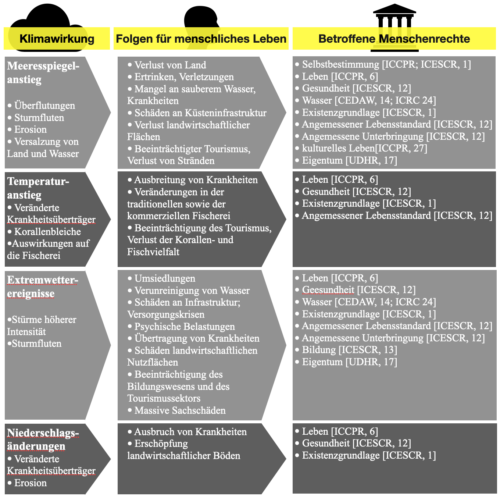Brief overview for your consideration: How are human rights and the climate crisis connected? Four dimensions:
- The consequences of the climate crisis affect human rights directly or indirectly – this particularly involves economic, social and cultural rights.
Hurricanes devastate whole swathes of land, floods force people to leave their homes, droughts make food scarce and sea-level rise salinises groundwater resources. The climate crisis is not simply an environmental crisis, it is a crisis that affects people. These disasters are happening everywhere, but affect different parts of the world differently. When livelihoods disappear and a life of security and dignity is no longer possible, human rights are affected. The most fundamental right threatened by the climate crisis is probably the right to life. The figure on the right shows which other rights are affected and where they are anchored. The fatal consequences of the summer drought of 2018 could be comprehensively mitigated in Europe through extensive state support. Not all states have the resources for this. That is why the climate crisis is extremely injust and reinforces inequalities and discrimination. Its fatal consequences usually hit particularly those people most severely who have contributed least to the crisis and are already structurally disadvantaged. These include, for example, people who experience discrimination because of their gender, religion, sexual orientation, origin, skin colour or other characteristics. - Those who stand up against the climate crisis and for climate justice have their civil and political rights violated.
Countless people protest against the lack of action by their governments, denounce abuses or demand justice. In order to do so, human rights, such as freedom of expression and freedom of assembly, are crucial. However, civil society engagement is increasingly under pressure and criminalised around the world. Nevertheless, conditions of engagement against the climate crisis vary considerably. Activists may experience police violence or protests may be stopped in one place. Elsewhere, activists are persecuted, arrested and imprisoned. In the worst situations, their efforts may even endanger their lives. Thus, it becomes clear that the conditions under which people participate in climate action are very different throughout the world. According to the organisation Global Witness, more than 500 climate activists were killed in South America and Africa between 2018 and 2020. People working for climate justice must be protected and their range and room to act be preserved. This is a crucial human rights obligation. - In the name of so-called climate protection measures, human rights are being swept under the carpet.
One thing is certain: major global reforms are needed if this crisis is to be stopped and a two-, three- or even more-degree warming compared to pre-industrial levels is to be avoided. Within a very short time-frame, the global economic system must become independent of fossil fuels such as oil and coal. The risk is that this urgently needed transformation will lead to new human rights violations. This cannot be allowed to happen. Hence, indigenous communities must not be driven out of their habitats for energy projects and forest protection programmes, for example. Electromobility must not lead to child labour in the extraction of needed resources. The shift from fossil fuels such as oil and coal, as well as the transition to renewable energies, must comply with human rights and be socially responsible. - Decision-makers have human rights obligations – and far too often fail to live up to them in times of climate crisis.
The fact that both humans and nature are being exploited and the climate crisis is thus being fuelled is not a coincidence, but is part of a system that puts profits before human rights. Since the climate crisis violates human rights, governments and corporations have a human rights obligation to combat the climate crisis with all possible measures in accordance with human rights. The human rights requirement is a policy that limits global warming to less than 1.5 degrees compared to pre-industrial levels. So far, efforts are far from sufficient, and especially wealthy countries are not living up to their responsibility.

